Cheap vs. expensive guitars: what’s the real difference?
In considering the difference between cheap and expensive guitars, several factors come into play. It’s essential to note that the value of a guitar can be subjective, as individual preferences and playing styles vary. However, certain distinctions often exist.
Materials and Craftsmanship: Expensive guitars typically use higher-quality materials and undergo more meticulous craftsmanship. The top wood, back and sides, neck material, and hardware can significantly impact the sound and playability of a guitar. High-end guitars often feature solid wood construction, which tends to produce a richer and more resonant tone compared to laminated wood used in cheaper alternatives.
Build Quality: Expensive guitars are often crafted with greater attention to detail. This includes factors such as the precision of the fretwork, the smoothness of the neck, and the overall fit and finish. Skilled luthiers may spend more time fine-tuning each component, contributing to better playability and overall performance.
Tonewoods: The choice of tonewoods plays a crucial role in the sound of a guitar. Expensive guitars often use rare or aged woods, contributing to a more nuanced and complex tonal profile. Cheaper guitars may use more readily available, mass-produced woods, which can result in a simpler sound.
Hardware and Electronics: Higher-end guitars may feature premium hardware and electronics. This includes tuners, bridges, and pickups. Expensive guitars often invest in advanced pickup systems that capture a more accurate representation of the guitar’s natural sound.
Brand Reputation: The brand can also contribute to the cost difference. Established and reputable guitar makers often command higher prices due to their history of producing high-quality instruments. This reputation can be a factor in the perceived value of a guitar.
Subjective Elements: It’s important to acknowledge the subjective nature of musical instruments. Player preferences, playing style, and intended use all play a role in determining the perceived value of a guitar. Some players may find a more affordable instrument that suits their needs perfectly.
In summary, the difference between cheap and expensive guitars often lies in the quality of materials, craftsmanship, and attention to detail. While expensive guitars may offer superior performance and tonal characteristics, the right choice ultimately depends on the player’s preferences, budget, and musical goals.






